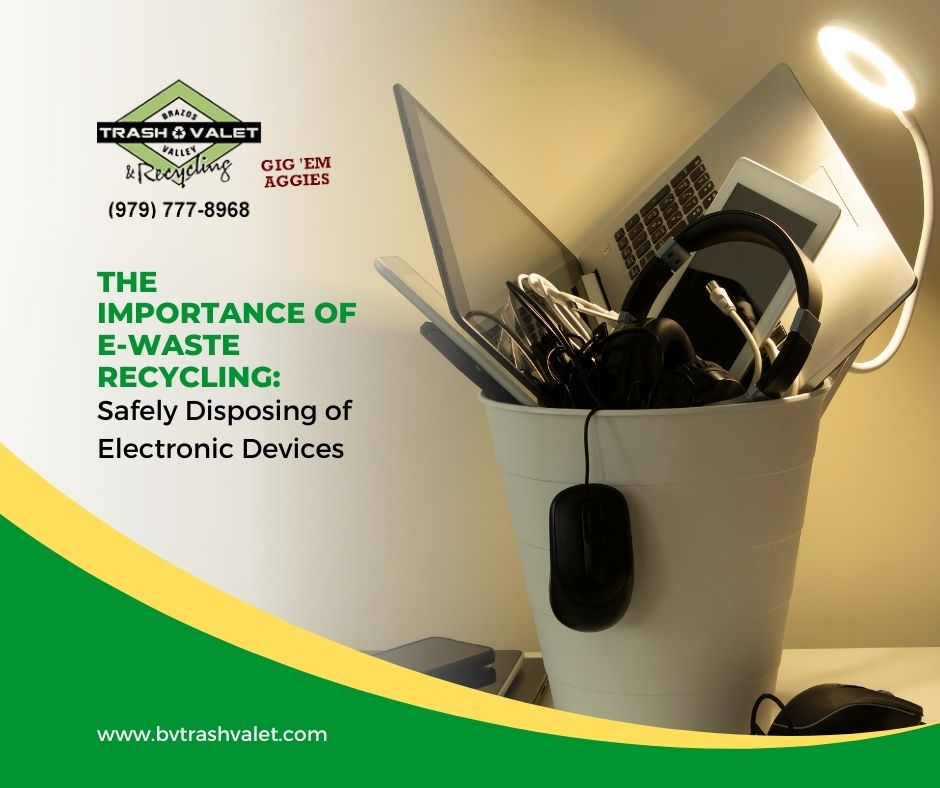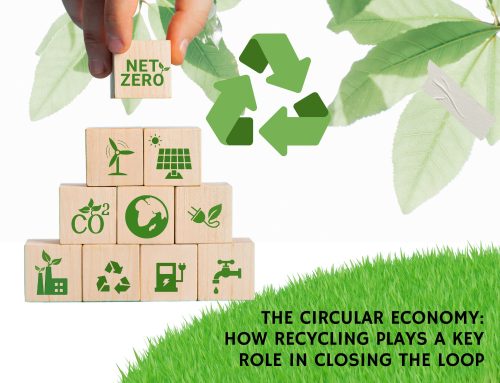The Importance of E-Waste Recycling: Safely Disposing of Electronic Devices
In our fast-paced digital age, electronic devices have become an integral part of our daily lives. From smartphones and laptops to televisions and kitchen appliances, these gadgets bring convenience and connectivity. However, with the rapid advancement of technology comes a growing concern: electronic waste, also known as e-waste. It is crucial to understand the importance of e-waste recycling and the responsible disposal of electronic devices to protect both our environment and personal data.

The Environmental Impact of E-Waste:
Electronic devices contain various hazardous materials such as lead, mercury, cadmium, and flame retardants. When improperly disposed of, these toxic substances can leach into soil and water, posing severe environmental risks. E-waste also contributes to air pollution when burned, releasing harmful gases into the atmosphere. Additionally, electronic devices often contain valuable metals like gold, silver, and copper, which can be recovered through recycling, reducing the need for further mining.
Safeguarding Personal Data:
In today’s digital era, protecting personal information is of utmost importance. When electronic devices are not securely recycled, there is a risk of data breaches and identity theft. Simply erasing files or performing a factory reset is not enough to ensure data privacy. Proper e-waste recycling involves secure data destruction methods, such as data wiping or physical destruction, to eliminate the risk of sensitive information falling into the wrong hands.
Promoting a Circular Economy:
E-waste recycling plays a vital role in the transition towards a circular economy. Instead of the traditional linear “take-make-dispose” model, a circular economy aims to minimize waste, extend product lifespan, and promote resource efficiency. By recycling electronic devices, valuable materials can be recovered and reused in the manufacturing of new products. This reduces the demand for raw materials, conserves energy, and minimizes the environmental impact of production processes.
The Role of Responsible E-Waste Recycling:
To ensure the safe and effective recycling of electronic devices, it is crucial to engage in responsible e-waste recycling practices. Here are some key steps to follow:
- Find certified e-waste recyclers: Look for reputable recycling companies that adhere to proper recycling practices and have certifications like R2 (Responsible Recycling) or e-Stewards.
- Remove personal data: Before recycling, ensure that all personal data is completely wiped from the device. If you are unsure how to do this, consult the manufacturer’s guidelines or seek professional assistance.
- Donate or resell usable devices: Consider donating or selling devices that are still in working condition. This extends their lifespan and allows others to benefit from them.
- Proper disposal of batteries: Many electronic devices contain batteries that require specific handling. Separate them and dispose of them according to local regulations or recycle them through designated battery recycling programs.
The importance of e-waste recycling cannot be overstated. By recycling electronic devices responsibly, we protect the environment, conserve valuable resources, and safeguard personal data. Embracing a circular economy mindset and supporting certified e-waste recyclers contribute to a sustainable future. Let’s make a conscious effort to recycle our electronic devices, ensuring a cleaner and safer world for generations to come.
Share This Story, Choose Your Platform!
The Importance of E-Waste Recycling: Safely Disposing of Electronic Devices
In our fast-paced digital age, electronic devices have become an integral part of our daily lives. From smartphones and laptops to televisions and kitchen appliances, these gadgets bring convenience and connectivity. However, with the rapid advancement of technology comes a growing concern: electronic waste, also known as e-waste. It is crucial to understand the importance of e-waste recycling and the responsible disposal of electronic devices to protect both our environment and personal data.

The Environmental Impact of E-Waste:
Electronic devices contain various hazardous materials such as lead, mercury, cadmium, and flame retardants. When improperly disposed of, these toxic substances can leach into soil and water, posing severe environmental risks. E-waste also contributes to air pollution when burned, releasing harmful gases into the atmosphere. Additionally, electronic devices often contain valuable metals like gold, silver, and copper, which can be recovered through recycling, reducing the need for further mining.
Safeguarding Personal Data:
In today’s digital era, protecting personal information is of utmost importance. When electronic devices are not securely recycled, there is a risk of data breaches and identity theft. Simply erasing files or performing a factory reset is not enough to ensure data privacy. Proper e-waste recycling involves secure data destruction methods, such as data wiping or physical destruction, to eliminate the risk of sensitive information falling into the wrong hands.
Promoting a Circular Economy:
E-waste recycling plays a vital role in the transition towards a circular economy. Instead of the traditional linear “take-make-dispose” model, a circular economy aims to minimize waste, extend product lifespan, and promote resource efficiency. By recycling electronic devices, valuable materials can be recovered and reused in the manufacturing of new products. This reduces the demand for raw materials, conserves energy, and minimizes the environmental impact of production processes.
The Role of Responsible E-Waste Recycling:
To ensure the safe and effective recycling of electronic devices, it is crucial to engage in responsible e-waste recycling practices. Here are some key steps to follow:
- Find certified e-waste recyclers: Look for reputable recycling companies that adhere to proper recycling practices and have certifications like R2 (Responsible Recycling) or e-Stewards.
- Remove personal data: Before recycling, ensure that all personal data is completely wiped from the device. If you are unsure how to do this, consult the manufacturer’s guidelines or seek professional assistance.
- Donate or resell usable devices: Consider donating or selling devices that are still in working condition. This extends their lifespan and allows others to benefit from them.
- Proper disposal of batteries: Many electronic devices contain batteries that require specific handling. Separate them and dispose of them according to local regulations or recycle them through designated battery recycling programs.
The importance of e-waste recycling cannot be overstated. By recycling electronic devices responsibly, we protect the environment, conserve valuable resources, and safeguard personal data. Embracing a circular economy mindset and supporting certified e-waste recyclers contribute to a sustainable future. Let’s make a conscious effort to recycle our electronic devices, ensuring a cleaner and safer world for generations to come.




